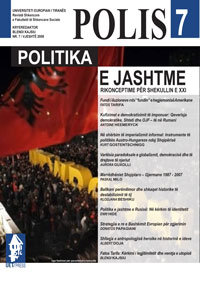Në shërbim të imperializmit informal: Instrumente të politikës austro-hungareze ndaj Shqipërisë
Serving the informal imperialism: Instruments of Austro-Hungarian politics towards Albania
Author(s): Kurt GostentschniggSubject(s): Politics, Geography, Regional studies, Economic history, Political history, Recent History (1900 till today), 19th Century
Published by: Shtëpia botuese “UET Press”
Keywords: Albania; Austro-Hungarian; politics; imperialism; instruments;
Summary/Abstract: The relative economic backwardness of Austria-Hungary in comparison with the western industrial countries and the inner economical structural crises were the reasons for its concentration of commercial and transport policy towards Southeast Europe. Since the Congress of Berlin in 1878 Austria-Hungary competed with Italy for the control over the sea and overland routes to secure the commercial and strategic hegemony in the western Balkans. In this context the Albanian territories had a crucial importance. The means to reach this aim were the shipping line “Lloyd”, the trade by the port of Triest, the agitation of the Austrian “Albania-committee”, assisted by the foreign ministry, and the hostel for Albanian students in Vienna, aided by the ministries of foreign affairs and commerce. Austria-Hungary played an important role for the independence of Albania, but it also aimed to have a growing political, cultural and economical influence in the little country in its southern periphery through an informal imperialism based on structural violence.
Journal: Polis
- Issue Year: 2008
- Issue No: 7
- Page Range: 40-62
- Page Count: 23
- Language: Albanian

